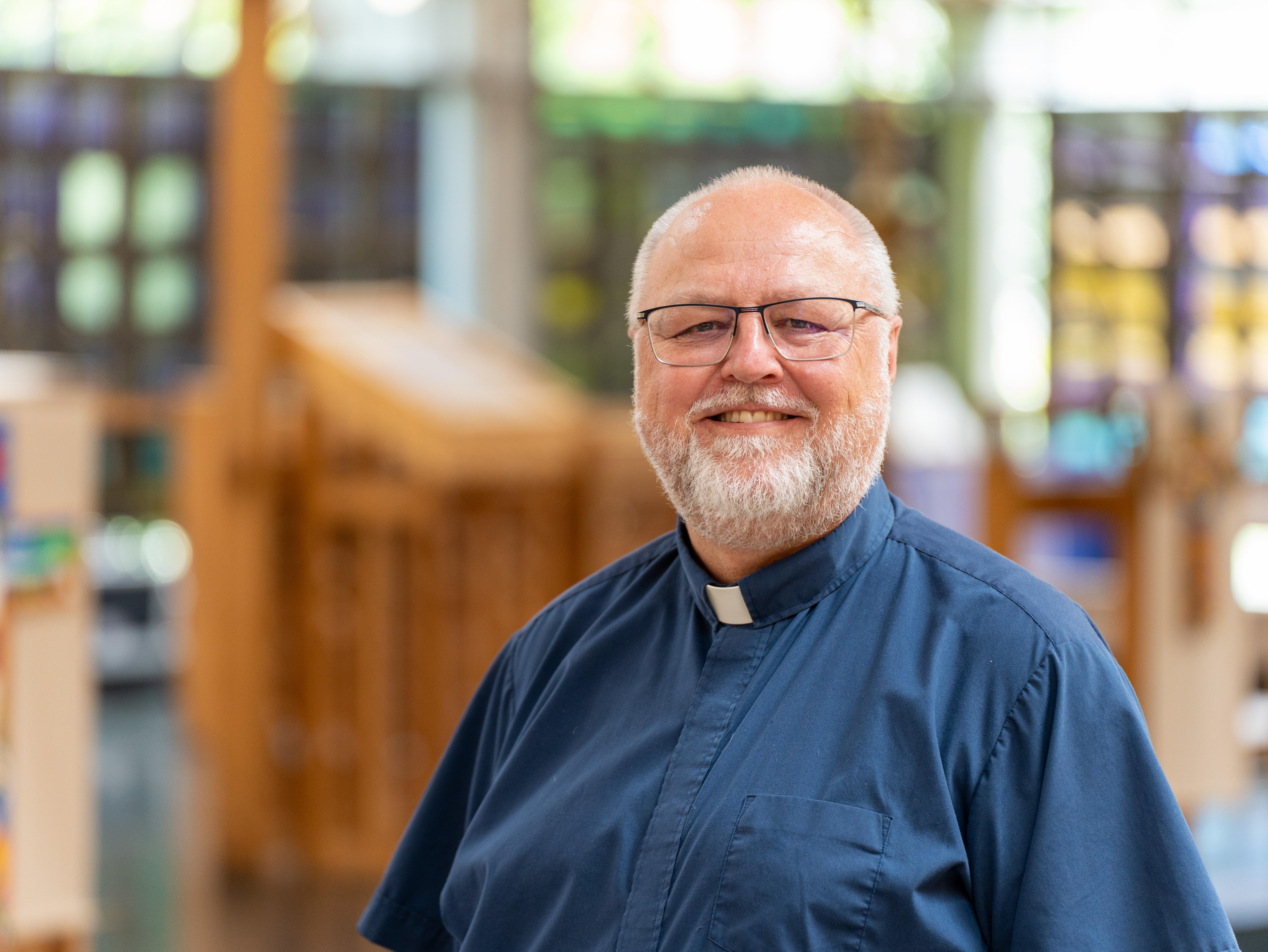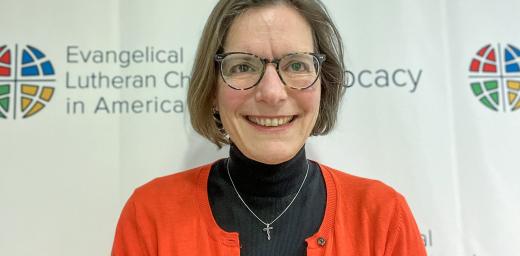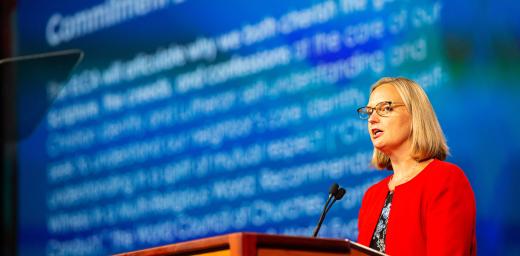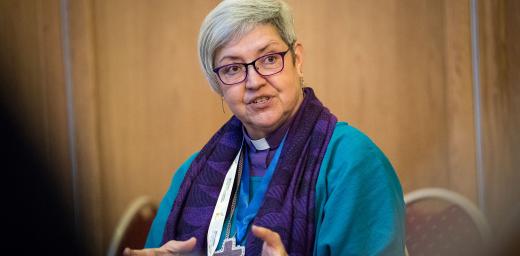(LWI) - Rev. Dr. Larry Kochendorfer, Bishop of the Synod of Alberta and the Territories of the Evangelical Lutheran Church in Canada (ELCIC) is a Lutheran World Federation Council member who sits on the Council Committee for Communion Relations and has nurtured a long-standing relationship with the synod’s companion partner, The Evangelical Lutheran Church of Colombia (IELCO), facilitating both congregational and synod journeys.
In this Voices from the Communion interview, Bishop Kochendorfer shares about his early formation in the church, how that experience informs how he engages youth in his synod, and the value of relationships that span the globe.
Tell us about your spiritual, faith and religious upbringing as a child.
I grew up on a family farm in Alberta, Western Canada. As a child, with an identical twin brother and three younger sisters, our parents felt it was very important that we have some religious education. This was essentially Sunday school, but they were not regular churchgoers themselves. My faith was nurtured through this congregation which was a faith community that encouraged children and youth and invited them to use their gifts. A member of the congregation encouraged me to start learning music at a very young age. There was a sense of welcome. The pastors and families in that congregation, through their welcome spoke volumes in terms of what faith looked like, how they lived their faith, and how they engage in the community, as well.
How has that experience as a youth influenced how you work with youth in your district?
Before I served as a bishop, when I was a pastor of three congregations in our synod, I never liked the adage “youth are our future,” I believe youth “are” the church now, so how do we incorporate them? I believe that process needs to start young. In some parishes and ministries children are encouraged through lessons or other activities like youth retreats. At times, these places are transformational for youth. Helping them see Canada and beyond, to see a larger world and to see themselves in that world was significant to them. As a bishop, I encourage the participating and formation of youth through larger youth gatherings and accompanying them on the journeys to those events. I like taking bus trips with youth to the youth gatherings because we have a chance to engage and get to know each other, they get to know me not only as bishop, but also as a person, and someone that they can talk to and vice versa.
Have you had the opportunity to see anyone from the cradle to seminary?
Yes. From my parish work there is person who is a pastor in the church now. They were maybe five or six years old when I first met them and I saw them grow in faith through Sunday school, confirmation, youth group and into pastoral ministry.
How do you encourage youth to show an interest in God’s global world?
First, I think the youth today are very different when it comes to global perspectives. When I was a youth, I was very enclosed in a farming community, but today many youths in Canada have access to social media, and therefore, have a larger picture of the world. In some ways, the role of the church is more about providing or seeking to provide places where faith can meet the world and where there can be conversations and opportunities for transformation to happen. They are ready for it. They want it.
Tell us about the Alberta synod’s companion church, The Evangelical Lutheran Church of Colombia?
My connection with the companion church began when I was as a parish pastor. We had members whose grandparents were missionaries to Colombia. Alberta was one of the earliest to send missionaries there and there were several families abroad who served. When I came to the congregation, they had just finished paying off the church mortgage and decided that they wanted to keep a sum in the budget for international projects. For the first two years, they donated and worked with Canadian World Relief, and then began a Colombia partnership. Our work began with education ministries supporting residences and providing a place for children to learn because for many of the rural students, it was impossible to continue their education beyond fifth grade. Initially, my contact was to with groups (at first with youth) to spend time with the community in Colombia, to make those connections, build relationships, and of course, to identify the need for other ministries and opportunities for learning from Colombia.
Since then, we have journeyed to Colombia every couple of years. The youth wanted to participate and join us, they recognized it as an opportunity to expand their own understanding of the world.
Youth who participated in these journeys shared their stories of transformation which interested their parents and siblings who would then go the next year. Eventually, the mission expanded and grew.
It is wonderful to also see how these experiences continue to influence their lives, individually, corporately and influenced career choices. There was one young person who went with the church to Mexico, who said in response to the poverty he witnessed on that trip, " I just can't handle this anymore, the poverty makes me sad.” He said that he didn’t think he would ever return. And I said to him, “but maybe you will see the significance of learning and help someone else journey.”
It was years later that I visited the congregation of that young person as the bishop. The person, who is now married and had children said to me, “Are you still doing those trips to Mexico?” I told him that we were connected to Colombia now. He said, “I’d like my wife to go.” This was touching to me and showed me how transformation happens throughout the life of one person.
What is the meaning of faith for you?
Fundamentally, faith is about relationship, God's relationship with us, with creation and vice versa. For me, the fundamental theological basis is always incarnational, and God with us and that translates to relationships, and trying to build and deepen relationships, wherever that might be.
As LWF Council member, how have you been able to guide others in the practice of relating?
Ultimately, I am a listener. When people are in a safe environment, they often feel freer to share their experiences, challenges and struggles. To be able to come alongside, and to be with people and learn from them has been a gift. There certainly are many challenges in terms of relations. There is accountability, but still, there's the autonomy of the member churches that presents a real balancing act, and yet to be a part of the communion allows for conversation, growth and learning. It is events like the Leadership Conference of the Americas held in Santiago, Chile this year and Council that bring us together again and again, connecting with the same people, sometimes meeting new people, but deepening those relationships.
What does it mean for your church, your work, you to be a part of the communion of churches?
The opportunity to make connections. The communion of churches affords us the ability to connect to people relationally and to share their stories.
LWF/A.Gray
The Lutheran World Federation is a global body that shares the work and love of Christ in the world. In this series, we profile church leaders and staff as they discuss topical issues and set out ideas for building peace and justice in the world, ensuring the churches and communion grow in witness and strength.






